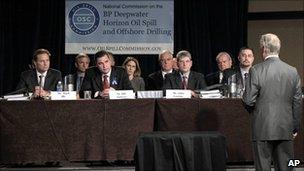Oil spill: BP 'did not sacrifice safety to save money'
- Published

Fred Bartlit challenged congressional claims during his presentation to the commission
An inquiry ordered by US President Barack Obama into the BP oil spill has given support to many of the company's own findings, challenging claims BP sacrificed safety to save money.
During a presentation to the oil spill commission, the panel's chief investigator said he agreed with 90% of BP's conclusions about the disaster.
But the panel's preliminary report, external said some BP actions had led to extra risks.
BP has been widely criticised since the 20 April blowout in the Gulf of Mexico.
The explosion on the Deepwater Horizon drilling rig killed 11 workers, polluted hundreds of miles of coast and led to the worst environmental disaster in US history.
Challenging claims
Fred Bartlit challenged congressional claims during his presentation to the seven-member National Commission on the BP Deepwater Horizon Oil Spill and Offshore Drilling, countering allegations that BP had made disastrous choices to save millions of dollars.
Among the claims, Democrats Henry Waxman of California and Bart Stupak of Michigan sent a letter in June to then-BP chief executive Tony Hayward claiming the oil company had made multiple decisions because of economic reasons that "increased the danger of a catastrophic well failure".
Criticism of the disaster has sprung in part from decisions made over the design of the BP well, which used a single pipe, known as a "long string", that ran from the sea floor to the bottom of the well.
Among the commission's preliminary findings, released on Monday, was that there was "no evidence at this time to suggest that there was a conscious decision to sacrifice safety concerns to save money".
"We see no instance where a decision-making person or group of people sat there aware of safety risks, aware of costs, and opted to give up safety for costs," Mr Bartlit said in his presentation.
He added: "We do not say everything done was perfectly safe. We're saying that people have said people traded safety for dollars. We studied the hell out of this. We welcome anybody who gives us something we missed."
But Mr Bartlit did say BP had left some important information out of its investigation into the disaster, which unleashed more than 200m gallons (757m litres) of crude oil into the Gulf. He added that there were areas where the panel's probe would conflict with BP's findings.
The commission's 13 key points focused on tests done to check the cement used in the well, decisions made by BP when plugging the well and the actions of those at the company in the hours before the disaster aboard the Deepwater Horizon rig.
BP and Transocean treated negative pressure tests as a "complete success", the report says, adding that laboratory data should have prompted a redesign of the cement slurry.
Once the crew on the rig recognised there was a problem, there were "several options that might have prevented or delayed the explosion", another key point states.
The report goes on to say that BP incurred "additional risk" through certain procedures.
Critics speak out
Despite the critiques by the commission, some groups feel the investigators could have come down harder on the oil giant.
Daniel Becnel, a Louisiana lawyer who is suing BP, said the new findings were "absolutely absurd".
"They are pasting over because they know the government is going to be a defendant sooner or later in this litigation," Mr Becnel said.
Billy Nungesser, the president of Plaquemines Parish in Louisiana, also challenged the panel's findings.
"Why cut corners if it is not for money?" he said.
Monday's presentation kicked off a two-day hearing that is due to include reaction from BP, Transocean and Halliburton, the contractor which did the cement job on the Macondo well.
A final report from the panel is due by 11 January.